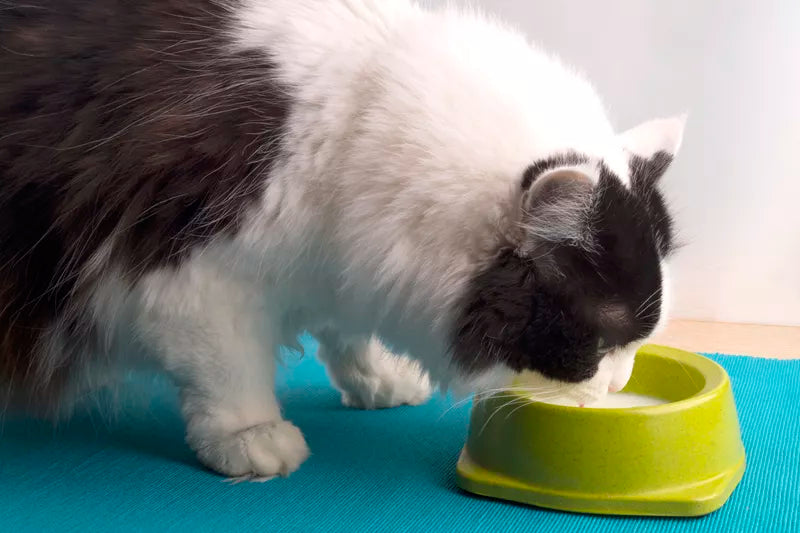When a healthy product is introduced in the market, most pet parents wonder if these are safe for their furbabies, too. Almond milk has gained popularity in many households as it is being introduced as a healthier alternative to cow’s milk and most pet parents are asking, can cats drink almond milk?
"For cats that are lactose-intolerant, almond milk appears to be a favorable alternative"
Can cats have almond milk? The answer is yes. Cats can have almond milk but only in moderation. As the famous saying goes “Too much of a good thing is bad.” In this article, we will look into almond milk for cats, how much is safe, benefits, and alternatives like oat milk.
Almond Milk for Cats
Contrary to what you might think, many cats are lactose-intolerant. This means that they are not able to digest milk the way we do. They do not produce any lactase enzymes that are needed to be able to digest a cow’s milk. For cats that are lactose-intolerant, almond milk appears to be a favorable alternative. However, as almond milk is nut-based, it is possible that it can irritate a cat’s sensitive stomach. This is why almond milk should only be given to cats in moderation.
If you consider giving almond milk to your furbaby, always check the label first. There are brands of almond milk that contain flavorings, artificial sweeteners, and preservatives that may cause an upset stomach. So, when giving cats almond milk, it is best to opt for almond milk that is unsweetened and contains no added flavorings.
Is Almond Milk Good for Cats?
Is almond milk ok for cats? Even when given in moderation, almond milk has some benefits for cats:
- Almond milk is a plant-based milk alternative made from almonds and water. It is naturally dairy-free and lactose-free, making it a promising option for cats that are lactose intolerant or for cats who have lactose sensitivities.
- It is soy-free and gluten-free with little to almost no amount of saturated fat and contains only half the calories of cow's milk.
- Almond milk does not possess any natural ingredients that are known to be harmful to cats.
- Cats find almond milk appealing to their taste palette.
- It is loaded with vitamins and nutrients. Almond milk is rich in Vitamin E which helps provide your furbaby with healthy skin and coat. Vitamin E is also known to contain anti-inflammatory properties that help manage any skin issues.
- Almond milk also contains potassium which helps with the proper function of cells in the body. It also has omega-3 fatty acids that are considered to be “good” fats for pets.

How Much Almond Milk Can Cats Have?
Whenever you start giving your cat something they have never tasted before, it is always a must to start with only a small amount and strictly observe how their bodies react to it. If there are no reactions, you may opt to increase just a little (a teaspoon or two!) and never too much!
Discontinue giving almond milk if you notice any sudden and strange changes. The most noticeable way to tell if your cat is tolerating almond milk well is by monitoring their bowel movements for a day or two. If consumed in excess, pay attention to any signs of food allergy, stomach upsets, or indigestion.
Here are the most common signs that you will need to look out for after giving almond milk to your cat:
- diarrhea
- bloated stomach
- vomiting
- gas
Aside from the issue mentioned above as a reaction to your cat having almond milk, extra calories are another concern. With obesity in pets being a big concern among pet parents, added calories that are being consumed outside of a healthy diet are unnecessary. According to experts, cats need approximately 24-35 calories per pound per day to keep a healthy weight. A cup of almond milk is roughly 100 calories! Adult cats do not necessarily need milk in their diet and the calories they will be getting from almond milk are devoid of the nutrients their body actually needs.
One of the drawbacks of giving almond milk to cats is that any spills create a sticky mess, compared to water. An easy way to prevent messes from spills or splashes is to place a Pawtect® Pad under your cat's bowls. These pads are super absorbent, with a StickyPaw™ backing that prevents slipping and sliding. That way if there is a mess from any sort of beverage, it stays locked in the pad and you can simply throw it in your washing machine. Plus, these come in packs of two, so you always have one on hand ready to go.

If your cat happens to spill on themselves, you can always use cat wipes for a quick, bathless clean. Pet WiPees™ Cat Wipes are perfect for removing everyday messes without giving your cat a bath. They contain only cat-safe ingredients and scents with no alcohols, parabens, sulfates, or harsh chemicals. So, if messes are your concern, don't worry! There's plenty of simple ways to handle potential messes.
What to Avoid in Almond Milk for Cats
Some almond milk is made with artificial sweeteners and other preservatives. These added ingredients do not only lead to allergic reactions and stomach upsets but also tooth decay and again, obesity. Artificial sweeteners added to almond milk may also contain xylitol. Even a very small amount of xylitol, according to Sunnyview Animal Care, can prompt an unexpected release of insulin in your furbaby, causing a low blood sugar level, also known as hypoglycemia. Even if your pet is able to endure the exposure, liver failure is relatively common. It is extremely toxic to cats.
If you are going to give almond milk to your cat, make sure to always check the label before anything else and only give in moderation. A teaspoon or a couple of sips on their food bowls is fine. Anything more than that amount is too much.
Alternative: Can Cats Drink Oat Milk?
Along with almond milk, many pet parents wonder: can cats drink oat milk? In terms of milk alternatives, oat milk is rising in popularity. So, can cats have oat milk? Is oat milk okay for cats? Yes, oat milk is safe for cats in moderation and can be given as a treat. Most cats like the taste of oat milk, but it should only be given in small amounts, no more than once a week. Oat milk does not contain any significant nutritional benefits for your cat, so it is not recommended as an ongoing aspect of their diet.
Similar to almond milk, oat milk may contain sugars or artificial sweeteners that are best to avoid. So, yes, cats can drink oat milk safely, but it should be a used as an occasional treat. Oat milk is not necessary for your cat’s diet and water should be the main means of hydration for your cat.
Can cats drink almond milk? Yes, and it will probably do no harm to your furbaby if you only give it in small amounts and in moderation. And although almond milk may contain nutrients that are good for your cat, there is nothing in it that your furbaby is not already gaining from their day-to-day diet. You can also give your cat oat milk in small amounts as a treat. Milk alternatives are a great choice in moderation for cats to avoid lactose and provide a delicious treat once in a while.
Almond milk for cats is safe in moderation
Most cats are lactose-intolerant and cannot digest milk
Oat milk is not harmful in small amounts as treats









